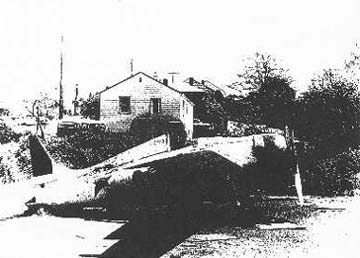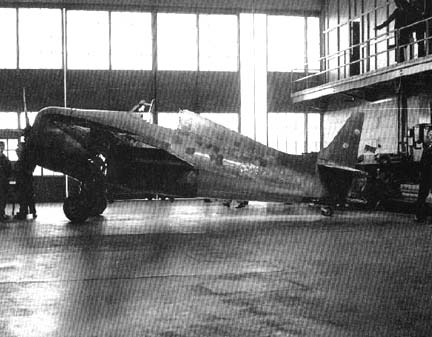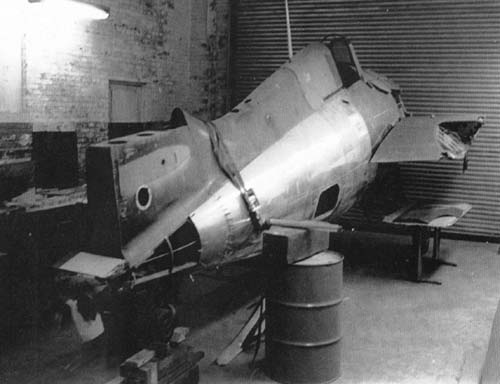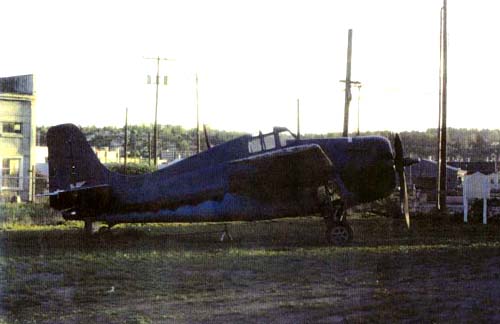|
We were very surprised and pleased
to learn recently (August '99) that an aircraft assigned to Squadron
VC 93 back in 1945 still exists and is in the process of being
restored at the "Seattle
Museum of Flight". What a marvelous coincidence that
of the hand full remaining of the 5,000 or so of these aircraft
that were built, one of these belonged to VC 93.
 The VC 93 aircraft was a playground fixture for eleven
years
The VC 93 aircraft was a playground fixture for eleven
years
(1959-1970) at the White Center Playground in the Seattle area. |
|
Mr. Milt James, who is in charge of the restoration, was interested
in contacting a pilot who had served aboard the aircraft carrier,
USS Petrof Bay, CVE 80, and who had flown an FM -2, preferably
the aircraft in his possession. In his search on the Internet,
he made a visit to "CVE-80
U.S.S. Petrof Bay" by Mr. Ivor Jeffreys. In this web
site Mr. James discovered that Mr. Jeffreys' father had served
on the Petrof Bay and was a member of the squadron VC 93 at the
time the aircraft in question was operating from the carrier.
Being that Mr. Jeffreys' father was a TBM pilot and did not fly
the FM-2, Mr. Ivor Jeffreys advised Mr. James of this web site.
Mr. James sent an E-mail to me requesting any assistance I could
give him concerning the combat history of his FM-2. A correspondence
has followed and it has been my pleasure to add my experiences
of VC 93 and his aircraft to his endeavor.

The aircraft was sent to Sand Point NAS
in the early '70's for cosmetic restoration. |
The pictures that are seen here are of an airplane that served
in the war in the Pacific during the Okinawa operation in 1945.
This plane was shipped to Guam aboard a transport carrier and
off loaded at Apra Harbor on the island of Guam in the Mariana
Islands early in 1945. A short time later, on March 10th, 1945,
it was loaded aboard the escort carrier, USS Petrof Bay, CVE
80. At the same time Composite Squadron, VC 93, was assigned
to the Petrof Bay. The combined combat team, the Petrof Bay,
VC 93, this FM-2 with it's sister FMs and the TBM torpedo bombers,
departed Apra Harbor for Ulithi anchorage where it joined the
rest of the American Pacific fleet that was being assembled for
the invasion of Okinawa.

Later, at the Cradle of Aviation Museum on Long Island |
On 25th of March this aircraft began its attacks on the Japanese
islands and in aerial combat with the Japanese air force, especially
the Kamikazes. The assignments for this aircraft were Local Combat
Air Patrol, LCAP, Target Combat Air Patrol, TCAP, and Direct
Support Group, DSG, (DSG is a flight of planes, either fighters,
bombers or both, directed to strafe and bomb the enemy in advance
and support of the Marine and Army ground troops).

Here is the aircraft as it appeared when Milt James and his team
at
The Seattle Museum of Flight began the present restoration effort. |
The squadron was credited with the destruction of 17 enemy
aircraft while in flight. Although it is known which pilots got
the credit , there is no record of which plane he was flying.
So it is possible that guns of this plane were the ones that
shot down three of the enemy on one flight and possibly more
on the other flights. This plane was one of twenty fighter aircraft
on board the Petrof Bay that participated in approximately 1400
sorties averaging about 70 flights per plane.
Each of these sorties was about three and one half hours in
duration totaling an average of more than 250 hours per plane
for those of the original twenty that survived the war as this
plane did. There were thirty fighter pilots in the squadron,
in all probability, each of these pilots flew this particular
aircraft at least once and most of the pilots more than once
due to the random positioning of the aircraft on the flight deck
and the assignment of plane numbers to each pilot as his name
appeared on the flight information board in the readyroom. |